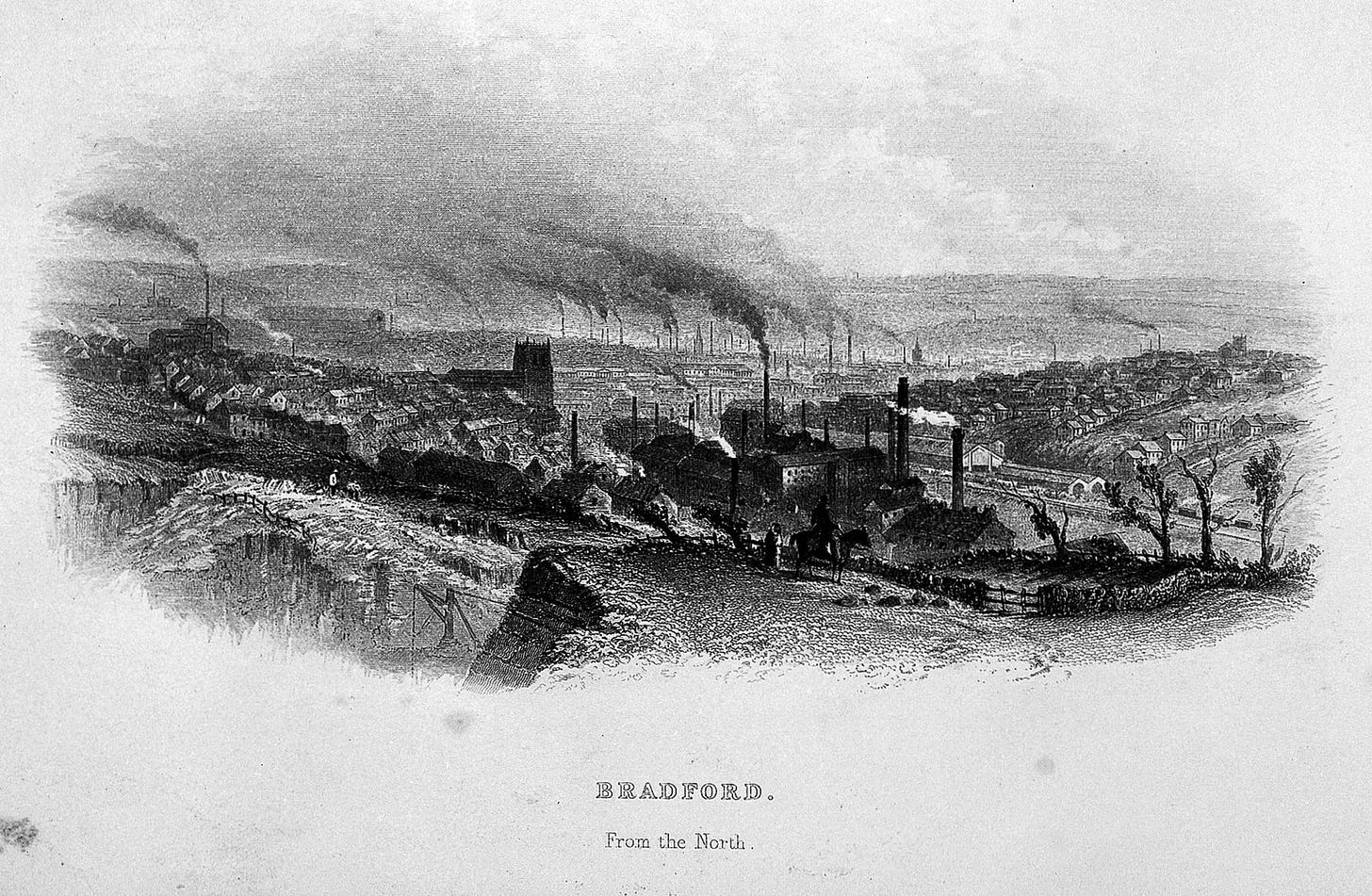A death sentence for a private detective
One Bradford sleuth fell in love with the woman he had been shadowing - but when he fell out of love, he resorted to murder...
Image of Bradford, from Wellcome Images
Several private detectives I've researched have been a bit underhand, and some have even been charged with offences such as fraud or perverting the course of justice. Criminal activity can be understand, if not condoned, in cases where detectives were shadowing individuals as part of divorce cases - they were being paid, and in some cases pressured, to find evidence of misdeeds, and it could be tempting to fabricate that evidence if necessary.
But the case of William Lane is one I've not come across before. William ended up at the end of a hangman's noose, all as a result of one divorce job he took on. It didn't have to be that way. He was a former policeman, an upright member of the community in Bowling, Bradford. He was a local man, middle-aged, known in the local area - but then he left the police force, and became a private detective.
In around 1894, he was contacted by John William Dyson, a Bradford stuff (fabric) buyer, who suspected his wife Elizabeth of having committed adultery with two men - Tom Mullen and Jack Mullen. He wanted Lane to shadow his wife, and find evidence of her doing so. Lane took on the job, and duly watched Mrs Dyson, a mother of one. He found that the Yorkshire woman, who earned money playing the piano in local pubs, was indeed having an extra-marital relationship. He drew up a report detailing his findings and presented it to Mr Dyson, who successfully petitioned for a divorce in 1895.
Unfortunately, while shadowing Elizabeth Dyson, William Lane had become somewhat enamoured of her, and when John Dyson divorced her, Lane walked out on his wife (also named Elizabeth) and children, with him setting up a new home with the divorcee. The press overdramatised this event, claiming that Lane had walked out on his wife and eight children - in fact, the couple only had four, although the younger two were still very young when their father left.
William and his lover Elizabeth Dyson, descrined as a married couple, in the 1901 census for Ecclesfield, South Yorkshire (TNA/TheGenealogist)
The public outrage meant that despite Lizzie Dyson having been born and bred in Bradford, they had to move out of the area. Initially moving to Barnsley, and in 1901, they were listed as a married couple lodging in Ecclesfield, near Sheffield. William was now earning money as a commercial traveller, while Lizzie was singing. The southern stretches of Yorkshire were still too close to home, though, and they then moved out of the county to Tividale in Staffordshire (it’s now part of Sandwell in the West Midlands). William's poor wife followed him down to Staffordshire with their children, settling in West Bromwich, perhaps to maximise their chances of getting some kind of maintenance from him.
Mrs Dyson had some money, and they appear to have lived off that. Once the money disappeared, William Lane discovered that he wasn't in love with Elizabeth as much as he had thought, and cooled towards her. But what should he do? He had lost his respectability, his wife and his children as a result of his relationship with her. His actions, though, were still shocking and difficult to understand.
On 26 June 1902, a passer-by walking down Gipsy Lane in Tividale found William Lane sitting on a kerbstone. Close by him was the body of Elizabeth Dyson, lying in a pool of blood, her throat having been cut. A shoemaker's knife, the murder weapon, was next to her. Her murderer had then written in her blood on each side of a white hydrant, "Coronation Day, 26 June" and "Kate Bryan [sic], murdered 26 June, on this spot."
The passer-by ran and fetched a policeman, and when he stood in front of Lane, the private detective made no effort to explain the circumstances away. Instead, he said,
"Yes, I have killed her. I have meant to do it for some time."
He was promptly arrested.
Shipley Times & Express, 15 August 1902 (via British Newspaper Archive). This story was of interest to the Shipley Times as the murder victim, Lizzie Dyson, and her husband had lived in the town for a while.
Justice came quickly. William Lane was tried at the summer Assizes the following month for murder, and despite his defence of insanity, he was convicted, and on 12 August 1902, at Stafford Gaol, the 46-year-old was executed. His widow, Elizabeth, moved to Solihull, a few miles south of Birmingham, where she gained work as a servant. Although her life was difficult, she now had a new life where nobody knew about the private detective husband who failed to remain professional with his work, who killed his client's ex-wife, and who suffered the ultimate penalty for doing so.







An interesting story! I have now subscribed.
Woah!